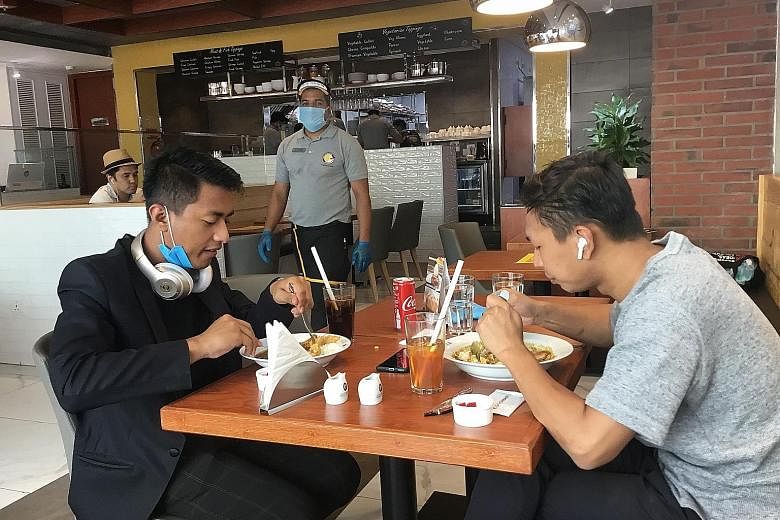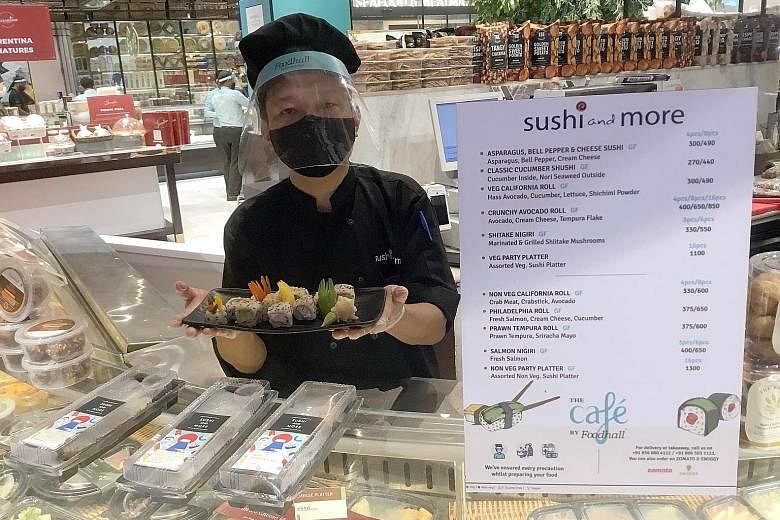Mr Tamotsu Nomura and his colleagues at CoCo Ichibanya, a chain specialising in Japanese-style curry rice, are up against a stiff challenge.
Not only do they do have to get Indians hooked on Japanese curry, they also have to do so at a time when people fear eating out amid the raging Covid-19 pandemic.
CoCo Ichibanya opened India's first restaurant dedicated to Japanese curry in Gurugram, a Delhi suburb, in August - a rare bold move in India's restaurant industry which has yet to recover from the impact of the pandemic's whiplashes.
"I cannot say it is a good time (to open the restaurant). We had no choice other than opening in the Covid-19 situation," said Mr Nomura, director of Ichibanya India.
The original plan was to open in March and most of the construction had been completed before a nationwide lockdown began on March 25.
"We knew there were people who were longing for us to open," he said. While restaurants were allowed to reopen in June, footfall still remains low.
CoCo Ichibanya averaged around 58 orders a day in August; most of them were dine-ins. The response has been more enthusiastic from the sizeable Japanese expatriate community in and around Delhi.
Mr Nomura, however, hopes Indians will take a liking to the popular Japanese household dish. "Our concept is bringing the curry back to its home as a transformed Japanese curry. We want Indian people to love it as a Japanese food," he said.
On top of the usual temperature checks and getting customers to use hand sanitisers, CoCo Ichibanya has replaced its physical menus with virtual ones that can be downloaded on to a customer's phone. Its seating capacity of 60 has also been halved to ensure physical distancing.
But even such measures were not enough for those like Mr John George, 37, who was at the eatery last Thursday to pick up his order. "Since the lockdown, I haven't eaten outside. Even when I order, I treat the packaging with caution and reheat the food," he said.
The food delivery industry has clawed back to around 85 per cent of the pre-Covid gross merchandise value, according to a Sept 23 blog post by Zomato, a popular food delivery platform in India.
Sushi and More, a Japanese chain dedicated to takeaways and delivery, launched its sixth outlet in India last month amid this rebound.
Its sales recovered from zero between mid-March and May to around 45 per cent of pre-Covid levels in June. This went up further to 90 per cent this month.
"The business is coming back really strongly," said Mr Harry Hakuei Kosato, founder of the chain. On Sept 6, it recorded its highest single-day sales since its launch in May 2011, he said.
The restaurant business, which accounted for an annual revenue of 4.23 trillion rupees (S$79 billion) in 2018-19, has been among those worst-hit by the pandemic.
"We would be very, very lucky if as an industry, we are able to do even 20 per cent of our erstwhile annual business this financial year," said Mr Anurag Katriar, president of the National Restaurant Association of India.
He has had to shut six of his 27 business establishments and lay off as many as 400 employees. Restaurants in Mumbai, where most of his establishments are based, are still not allowed to reopen and earnings for his firm have been nearly non-existent since March.
"It is massive, it is an existential crisis," he told The Straits Times.
Mr Katriar estimates that anywhere between 20 per cent and 30 per cent of restaurants may never open again and that it could take another three quarters for businesses to return to pre-pandemic levels.
Yet, amid this crisis, many businesses have reinvented themselves for survival by focusing entirely on delivery and takeaways, including do-it-yourself food kits.
Chefs have also turned their homes into cloud kitchens to tap the demand for restaurant-like food.
It is also an opportunity, argued, Mr Katriar, to cut down on the "extra fat" in the industry such as by trimming ostentatious menus that add more to expenses than revenue.
"When businesses are running, you never sit back and look at the girth that accumulates. But now, we all have to reimagine our businesses. This is the time of going asset light and low risk completely," he added.


